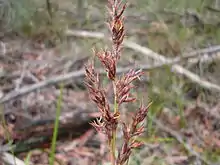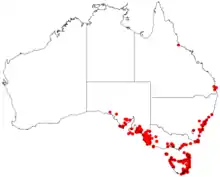Lepidosperma concavum
Lepidosperma concavum, commonly known as the sandhill sword-sedge, is a plant found in coastal regions of south-eastern and eastern Australia. It grows on sandy soils in woodland, forest and heathland.[1]
| Sandhill sword-sedge | |
|---|---|
 | |
| Scientific classification | |
| Kingdom: | Plantae |
| Clade: | Tracheophytes |
| Clade: | Angiosperms |
| Clade: | Monocots |
| Clade: | Commelinids |
| Order: | Poales |
| Family: | Cyperaceae |
| Genus: | Lepidosperma |
| Species: | L. concavum |
| Binomial name | |
| Lepidosperma concavum | |
 | |
| Occurrence data from AVH | |
| Synonyms | |
| |
Description
The sandhill sword-sedge is a tufted perennial with a short vertical rhizome and rigid, erect, sharp-edged culms. It grows to 20–60 cm in height and 3–7 mm in width. The inflorescence is ovate to oblong, 3–15 cm long and 2–4 cm in diameter, with a shorter involucral bract. The numerous spikelets are 5–8 mm long. The smooth, pale to dark brown, ovoid nut is 2.7–4.0 mm long and 1.3–1.8 mm in diameter. It flowers in spring and summer.[1]
This article is issued from Wikipedia. The text is licensed under Creative Commons - Attribution - Sharealike. Additional terms may apply for the media files.